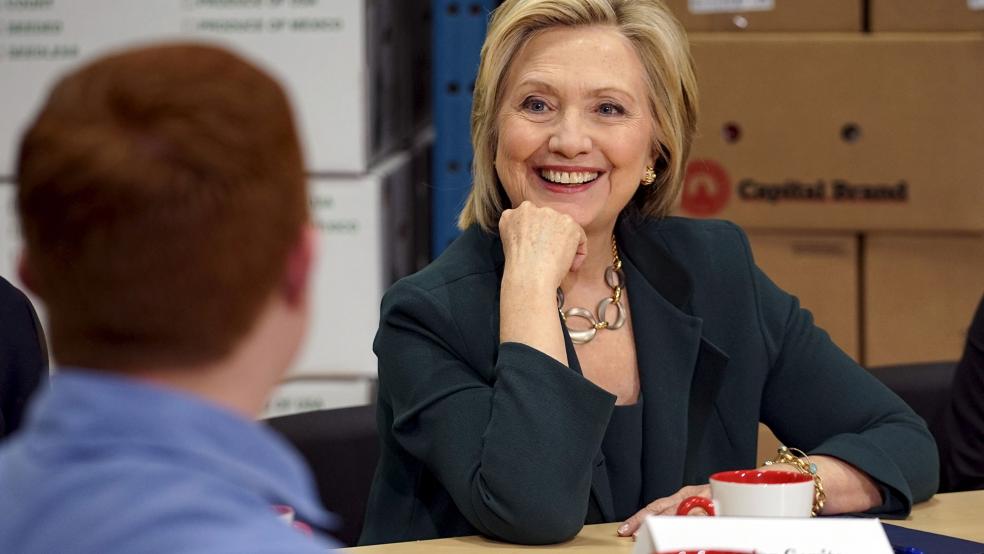When people talk about Hillary Clinton and “honesty” the question is usually about whether she can be trusted to tell the whole truth about real and trumped-up scandals that have been near-constant elements of the political life she has shared with her husband for the past three decades.
But there’s another kind of honesty that voters have a right to expect from their elected leaders: intellectual honesty, the willingness to engage in fair-minded debate about the key issues confronting the country without retreating into the obfuscation and hand-waving that marks too much of our political debate. A day after Clinton’s major campaign rally in New York, the prospects for an intellectually honest campaign looked dim.
Related: Clinton Plays the Gender Card as a Campaign Strategy
A parade of senior Clinton advisers appeared on the Sunday talk shows this morning and to a person delivered disingenuous and intellectually dishonest answers to direct questions about Clinton’s position on whether or not she thinks President Obama ought to be granted Trade Promotion Authority.
On Friday, Democrats in the House of Representatives came together to vote against a part of a package of legislation that would allow President Obama to negotiate international trade deals and bring them to the floor of both houses of Congress for up-or-down votes, with no opportunity for amendments. It’s known as Trade Promotion Authority, or “fast track.”
By any measure, it was a sharp rebuke for the president: his own party came together to deny him an authority that has been almost routinely granted to presidents, in one form or another, for generations. Where the prohibitive favorite to win the Democratic nomination for president stands on the issue is obviously a highly relevant question.
However, across multiple appearances on Sunday morning (senior advisor Karen Finney on Fox, senior adviser Joel Benenson on ABC, campaign manager Robby Mook on CBS, and campaign chairman John Podesta on NBC) Clinton’s surrogates uniformly avoided answering the simple question: Does Clinton believe Obama should have fast track trade authority?
Related: Pelosi Torpedoes Obama’s TPA
They did so either primarily by pretending that they had been asked a different question: Does she support the Trans-Pacific Partnership, a trade deal currently being negotiated? This allowed them to say that it was, of course, too early for her to have an opinion on the deal because it’s not finished.
Appearing on Fox, Finney resolutely and repeatedly avoided taking a clear position on fast track, repeatedly reiterating Clinton’s guidelines for what a trade deal should look like in spite of repeated attempts by a visibly frustrated host Chris Wallace to get her to respond to his actual query.
“That was one of the most painful interviews I think I’ve watched in a long time,” said Rep. Paul Ryan (R-WI), who appeared opposite Wallace on the following segment.
(Finney, apparently, has been frustrating questioners all weekend. Also on Sunday, CNN’s Jake Tapper, host of State of the Union, said that he had asked similar questions of Finney on Saturday. “I thought I was going to have an aneurysm trying to get an answer from her on what Hillary Clinton’s position was,” he said.)
Related: How TPA Could Make Trade Deals More Transparent
Podesta, speaking to Chuck Todd on Meet the Press, hit the same talking points as the other Clinton advisers on the shows, but broke ranks slightly by tacitly admitting that there had at least been debate about another issue.
That debate, he suggested, wasn’t really important.
“What we’ve seen the last couple of days is skirmishes around the process for considering that agreement,” he told Todd. “But the agreement is not final and when it is she’ll render a judgment about that.”
Here’s the thing: Pretending that giving the president fast track authority is a side-issue unrelated to the treaty that eventually comes before Congress is an utterly bogus argument, and anybody smart enough to be in a senior position on Clinton’s campaign certainly knows that.
Related: Liberals Can Step Up Today to End a Congressional Charade
The promise of an up-or-down vote in Congress is an essential element of the negotiations the administration is currently engaged in with 11 other Pacific countries. None of the other parties to the deal will put forward their final offer so long as they know that Congress might be allowed to get under the hood of the deal and start tinkering with it.
That means that until and unless the president gets Trade Promotion Authority, any deal he brings before Congress will necessarily be unfinished. Podesta et al. are claiming that Clinton is right to withhold final judgment until a final deal is reached, which is practically tautologous. But at the same time they are refusing to take a position on the only means by which such a final deal can be negotiated.
Rep. Ryan, during his appearance on Fox, seemed to speak for most of the journalists dealing with the Clinton campaign on the issue when he advised her, “Pick a position. It’s what leaders do.”
Top Reads from The Fiscal Times





